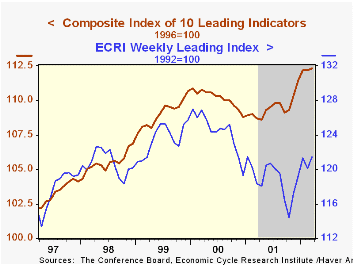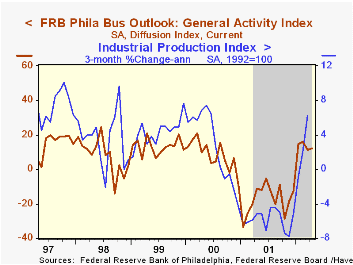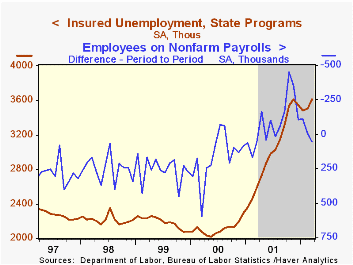 Global| Apr 18 2002
Global| Apr 18 2002Leading Indicators Up Slightly
by:Tom Moeller
|in:Economy in Brief
Summary
The Composite Index of Leading Economic Indicators rose last month by slightly less than expected. February was little revised. 60% of the component series contributed to the increase. The breadth of component series gain, itself a [...]

The Composite Index of Leading Economic Indicators rose last month by slightly less than expected. February was little revised.
60% of the component series contributed to the increase. The breadth of component series gain, itself a leading indicator of the leading indicator series, has narrowed from 90% in December. The six-month diffusion index improved to 75%, its highest since December 1999.
Weekly hours, stock prices, the yield curve and consumer expectations contributed meaningfully to the leaders rise while jobless claims and building permits had large negative contributions.
The Leading index is based on eight previously reported economic data series and two that are estimated.
| Business Cycle Indicators | Mar | Feb | Y/Y | 2001 | 2000 | 1999 |
|---|---|---|---|---|---|---|
| Leading | 0.1% | 0.0% | 3.3% | -0.6% | 1.0% | 3.3% |
| Coincident | 0.2% | 0.2% | -0.3% | 0.3% | 3.4% | 3.2% |
| Lagging | -0.4% | -0.5% | -5.6% | -1.3% | 2.8% | 1.8% |
by Tom Moeller April 18, 2002

The Philadelphia Fed’s index of general business conditions rose modestly in April, as expected, and remained positive for the fourth consecutive month.
New orders, shipments and unfilled orders rose while delivery lead times eased. Inventories continued to fall.
The business conditions index reflects a separate survey question, not the components.
Pricing pressure firmed further versus its low last October.
| Philadelphia Fed Business Outlook | April | Mar | Y/Y | 2001 | 2000 | 1999 |
|---|---|---|---|---|---|---|
| General Activity Index | 12.3 | 11.4 | -11.3 | -17.3 | 8.2 | 13.3 |
| Prices Paid Index | 7.5 | 3.0 | 6.6 | -1.0 | 27.1 | 10.0 |
by Tom Moeller April 18, 2002

Initial claims for unemployment insurance rose more than expected from the prior week's level that was revised up.
The initial claims figure is for the BLS April survey period, but because folks already receiving unemployment benefits are technically required to re-file for extended benefits, the initial claims figure is artificially raised.
Continuing claims for unemployment insurance nevertheless surged to the highest level since 1983. This figure is not distorted by filings for extended benefits, except that the rise does indicate that the rate of new job creation is not high. The prior week's level was revised down slightly.
Correlations between the monthly change in initial jobless claims and nonag payrolls are higher than between continuing claims and payrolls.
The four-week moving average of claims rose sharply to 448,750.
The insured rate of unemployment rose to 3.0%.
| Unemployment Insurance (000s) | 04/13/02 | 04/06/02 | Y/Y | 2001 | 2000 | 1999 |
|---|---|---|---|---|---|---|
| Initial Claims | 445.0 | 444.0 | 11.8% | 405.8 | 299.8 | 297.7 |
| Continuing Claims | -- | 3,839 | 46.1% | 3,021 | 2,114 | 2,186 |
Tom Moeller
AuthorMore in Author Profile »Prior to joining Haver Analytics in 2000, Mr. Moeller worked as the Economist at Chancellor Capital Management from 1985 to 1999. There, he developed comprehensive economic forecasts and interpreted economic data for equity and fixed income portfolio managers. Also at Chancellor, Mr. Moeller worked as an equity analyst and was responsible for researching and rating companies in the economically sensitive automobile and housing industries for investment in Chancellor’s equity portfolio. Prior to joining Chancellor, Mr. Moeller was an Economist at Citibank from 1979 to 1984. He also analyzed pricing behavior in the metals industry for the Council on Wage and Price Stability in Washington, D.C. In 1999, Mr. Moeller received the award for most accurate forecast from the Forecasters' Club of New York. From 1990 to 1992 he was President of the New York Association for Business Economists. Mr. Moeller earned an M.B.A. in Finance from Fordham University, where he graduated in 1987. He holds a Bachelor of Arts in Economics from George Washington University.
More Economy in Brief
 Global| Feb 05 2026
Global| Feb 05 2026Charts of the Week: Balanced Policy, Resilient Data and AI Narratives
by:Andrew Cates






